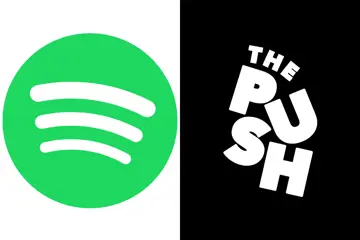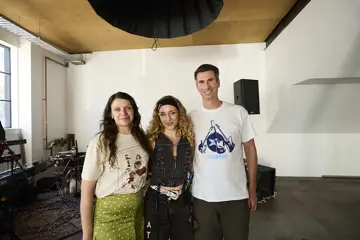Here's (literally) a quick pop quiz for you all.... what do Stevie Wright, Hunters & Collectors, 1927, Sherbet, Archie Roach and Divinyls have in common?
Yes, that's right, they're all legendary acts that have created the music that forms an artistic part of Australia's heritage.
The only problem is, their music is no longer produced for you to own, hold, and hand down to your kids... or pass to your neighbour to play at the next barbecue.
Jimmy Barnes holds the Australian record (ironic use of words, but I digress) with 15 #1 albums! From Bodyswerve to Blue Christmas, the legend has released well over 20 albums that, again, have loudly contributed to the fabric of Australia's musical tapestry. Wanna take a guess at how many of these albums are still available in a physical form (at the moment)?
Four.
The Soul Searchin' 7" singles box (reckon that's getting a re-press?); Hits; Working Class Boy soundtrack, and Blue Christmas. No For The Working Class Man, no Two Fires, not even Soul Deep.
Don't miss a beat with our FREE daily newsletter
The greatest downside to the streaming revolution is the financial waterfall it has created that lands in the pockets of those companies that have chosen to take the route of not releasing physical product for stores to stock and for fans to buy.
As the owner of a store that's been around since the mid-'90s, I've been wanting to write an op-ed on this situation for some time now, and the closure this week of the last Sanity store has provided the impetus for me to stare at my picture of Grandpa Simpson yelling at clouds and write something that, I hope, will get a discussion going in this industry that I love, and have been an active part of for over 40 years.
In this story, there was one quote from Sanity owner Ray Itaoui that everyone should take note of:
"With our customers shifting to digital for their visual and music content consumption and with diminishing physical content available to sell to our customers, it has made it impossible to continue with our physical stores."
It is not just a consumer shift driving the hardships for record stores, it's the labels who own the content becoming less and less willing to produce physical products. At just a few dollars per unit to manufacture, it's hard to see why keeping popular, evergreen CDs in print is not a viable model. Sure, they aren't selling at 1999 levels, but there is a market for those who want to hold and own their music collections.
Now, there are several issues to be addressed when cracking open this egg, so let's have a look at them.
1. A successful music industry, particularly like the one we've enjoyed in Australia for so long, works at its best when it's intertwined. The record companies, the tours, the retail environment, the punters and, most importantly, the artists themselves. The people who created the product that our industry is built upon. Without the artists, there is literally no music industry.
This morning, I had breakfast with Russell Morris, an absolute legend who has given us many hits and is touring all the time. He doesn't have a greatest hits CD to sell, but knows if he did, the fans would be purchasing it from the merch desk every night. This Friday night in Canberra, I'm helping John Schumann sell his merch at a sold-out concert, to an audience more than willing to purchase physical music. The problem is, his solo product is no longer available and he doesn't own the rights.
When a chain of stores like Sanity closes down it hurts everyone in the industry - nobody wins. If JB Hi-Fi ever decides to move out of music, is it even going to be feasible to have the current record company structures that we have now?
I worked at RCA and CBS/Sony, I've been in music retail (and the media) and worked with many, many acts and see things clearly from all sides. I understand why record companies have made huge cuts to their stocks over the last 5-10 years.
But I don't (totally) agree with them.
As we've seen with the resurgence in vinyl, the music fans - the absolute blood of the music industry - want what they want. They all know there's a digital option, and most of them use it which they should, even though they are aware their favourite artists don't get what they deserve, but let's not shake that money tree this time around.
CDs and LPs should still be getting manufactured and treated as ongoing product. If you think the vinyl sales numbers you read are impressive, they are a small percentage of what could be sold if there was more product in the flow pipe. Nowadays, essentially every release is like a limited edition, going out of stock quickly after release... the examples would scare you. How can a physical market based on discovery thrive if by the time word of mouth travels, the product isn't available?
I can hear many of you right now telling me to "get over it", "it's the way it is now" and "there aren't any/many stores left now, anyway".
Most in Record Company Land want to yell at me about warehousing costs, the price and hardships around manufacturing, returns and low sales numbers.
Well, selling music is all about commitment, reward and risk. Business As Usual paid for (less successful Australian act) Full Marks (granted, an obscure reference but you get my point) and Kylie's success paid for... lots of different releases.
Is it really that difficult to sell Sherbet CDs, Archie Roach records and anything that has Evie Parts 1,2,3 on it? (No, that track is not available on anything currently in production in Australia.) And it's DEFINITELY easy to sell the albums of the hundreds of amazing artists, both heritage and new, who are out there night after night, essentially creating their own pop-up record stores with merch desks in venues across Australia.
I'm not suggesting overproducing and overstocking, but even if you don't have a local JB or indie store, there are billions of people that have access to the retail world online.
Please don't tell me these things don't sell and that people aren't interested in them. It can't sell if it's not available in the first place.
And to those companies that are retaining the physical rights to producing product but have decided not to, please, please do the right thing and give that right back to the artists so they can make some product themselves to sell online or at their shows. You've (justifiably) made money from when their product was available, you're making money from their digital consumption, surely they deserve the opportunity to look after themselves, their families and their marketplace after creating the music and the memories that we've all feasted on for so long.















